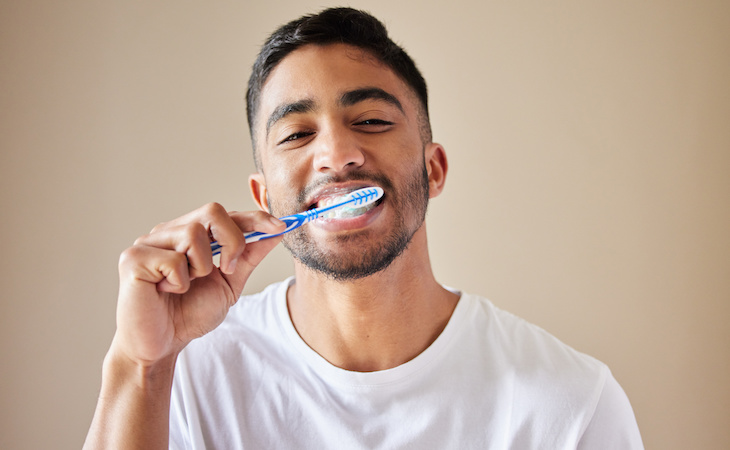Staying healthy is often all about maintaining the best habits and routine—and this couldn’t be more true than when it comes to a pre-bedtime oral care routine.
Much as you may be certain to cleanse our face or put up our hair before bed, staying on top of brushing, flossing, and other nighttime oral care best practices is what can keep your smile beautiful—and as healthy as possible.
The importance of a nighttime dental routine
A nighttime oral care routine is about more than a shiny and pretty smile—it’s crucial for maintaining good oral health.
“Throughout the day, bacteria and food particles accumulate in your mouth, leading to plaque formation, cavities, and gum disease if not properly removed,” says Brooke Buller, DDS, co-owner of Claybrooke Dental in Gahanna, Ohio.
Staying hydrated is also a way of avoiding having dry mouth issues, which are more likely to occur at night.
“Additionally, during sleep, you are more prone to dry mouth, which lowers the pH of your oral cavity, leading to demineralization of teeth and inflammation of oral tissues,” says Buller. “Demineralization, together with plaque debris, can cause significant damage.”
The best oral care routine before bed
Stay hydrated
It’s important to drink lots of water throughout the day to maintain a healthy body. That includes your smile. However, drinking too much just before bed is a great way to interrupt your sleep during the night. So, you have to know when to cut off at night.
“It’s important to stay hydrated to neutralize oral pH levels, but try to stop drinking water two to three hours before bedtime so as not to disrupt your sleep,” says Buller.
Floss regularly
Whether it’s that sandwich you ate at dinner or the snacking you were doing while binge-watching your favorite show, there’s going to be bacteria and debris that stick around in your mouth when you’re done. You’ll want to make sure all of it’s gone before heading to bed so it doesn’t stick around all night long.
“Use floss or a Waterpik to remove debris and bacteria from your teeth, which will be brushed away later,” says Buller. This helps target areas where your toothbrush can’t reach.
Brush your teeth, and don’t rush it
You probably already know that good dental practice is to brush your teeth for at least two minutes before bed. However, how you brush matters as well.
“Electric toothbrushes are great because they handle so much of the work for you, and the built-in timer ensures you’re not skimping on time,” says Buller, who personally uses an electric toothbrush that features a pressure sensor. “It alerts me if I brush too hard, which helps prevent gum recession.”
Choose the right toothpaste
The best dental care routine includes brushing your teeth with the right toothpaste. Dominik Nischwitz (aka “Dr. Dome”), a pioneer of biological dentistry, suggests using an all-natural toothpaste with hydroxyapatite as an active ingredient.
Nischwitz says coconut oil works as a great base, and xylitol in your toothpaste is also a win since it kills the bad bacteria. “I also recommend using a soft toothbrush and massaging the gums too,” he adds.
Scrape your tongue
Teeth aren’t the only area of your mouth where bacteria and debris may be sticking around. After brushing is a great time to use a tongue scraper.
“All that’s needed is just a couple of seconds of scraping to get food debris and bacteria off the ground of the tongue,” says Nischwitz. “Tongue scraping also helps with bad breath.” A copper tongue scraper is a good option.
Try oil pulling
Nischwitz recommends finishing off your routine with five to 10 minutes of coconut oil pulling.
“This is an ancient Ayurvedic strategy that helps to soothe the gums and balance your oral microbiome,” he explains. “Plus, coconut oil is antibacterial.”
You simply take a teaspoon of extra virgin coconut oil and swish it around for the prescribed time. “Make sure to spit the oil in the bin after the swishing,” notes Nischwitz. This routine can be done in the am or pm.
Consider a night guard
Lastly, if you grind or clench your teeth at night, then wearing a night guard can help protect your teeth from wear and tear.
“A night guard also takes pressure off the TMJ joint, relaxes muscles of mastication (chewing), and prevents tooth-on-tooth wear from grinding,” says Buller.
FAQs
How do you take care of your teeth at night?
Nighttime oral healthcare is all about removing excess bacteria and debris from your mouth so you start the night as clean and fresh as possible. This includes brushing and flossing and staying well hydrated as part of a nighttime oral care routine.
What are three oral care practices you should complete morning and night?
You should be brushing, flossing, and tongue scraping morning and night for prime oral health and a beautiful smile. “Clean between your teeth at least once per day—whether it’s with traditional floss, a Waterpik, or any type of interdental cleaner that works best for you,” says Buller.
Can I skip brushing my teeth one night?
Yes, we’re all human! And skipping brushing for one night won’t cause immediate harm; however, habits are important. “Not brushing over time can quickly lead to plaque buildup, cavities, gum disease, and more,” says Buller.
What should your nighttime skincare routine consist of? Next, learn how to put together the best evening beauty routine for you.




